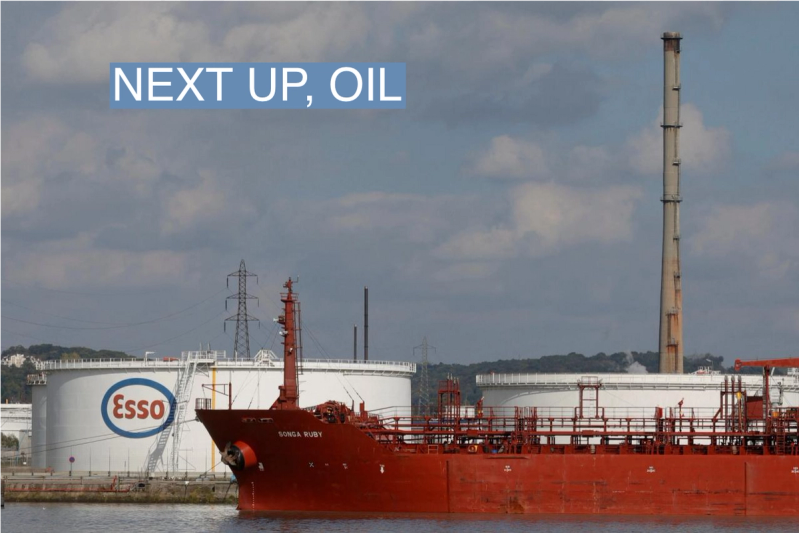The News
Europe is trying to wean itself from Russian gas. The U.S. is trying to make sure energy prices don’t rise for its own citizens. And now the Biden administration is scrambling with a surprising next step: Helping Russian oil reach markets around the world when the European Union stops buying after next month.
U.S. officials describe the effort to keep Russian barrels of oil moving around the globe — as long as they’re bought and sold below a price set by Vladimir Putin’s Western opponents — as the best way to lower Russia’s profits and also keep global energy prices lower.
European and UK insurers and shippers are critical to the effort, since their services are required for the delivery of most of the world’s oil. As Europe’s ban is currently written, they won’t be allowed to help after Dec. 5, when the new rules kick in. Europe and other Western powers have been discussing the U.S.-led effort. But the insurers and shippers are resisting, according to people familiar with the matter.
Some of them faced tough U.S. sanctions in the past when they’ve interpreted what they say often become complicated, shifting U.S. rules in similar schemes covering business with Iran and Venezuela.
“We want guarantees that we will be protected,” a person at one insurer told Semafor.“This is a delicate situation and we don’t want to take any chances.”
On Friday, at the end of a historic week of decisions about energy policy triggered by Russia’s ongoing military campaign in Ukraine, the EU reached a compromise on how members will treat gas purchases as Russian supplies dwindle. The union agreed to impose a loose ceiling on gas prices at the biggest exchange, a move designed to rein in financial speculation and prevent members from bidding prices up among themselves as they scramble for supplies.
U.S. officials are more worried about a European ban on Russian oil that starts to take effect in early December. The measures include prohibiting European and UK insurers and shippers from supporting Russian shipments anywhere in the world. While they share the European aim of slashing Russian oil profits, U.S. officials fear Europe’s refusal to buy Russian oil will only push up global crude prices if those barrels can’t be sold elsewhere. That could wind up enriching the Russian government further, even if it sells fewer barrels of oil.
They want Europe to ease looming restrictions so their insurers and shippers can support deliveries of Russian crude to other customers that are sold below a price cap that will be set by the U.S. and Europe.

The twin price caps — on gas purchased in Europe and oil sold by Russia — underscore how efforts by Europe to reduce energy dependence on Russia are reverberating around the world.
Europe’s supplies will remain on a knife’s edge through well into 2024, European leaders worry. Reserves of gas have reached surprisingly robust levels, which will ease stresses this winter when demand is highest, but they will have to be refilled or replaced in time for next winter, a dicey prospect without Russian gas. That will exacerbate anxiety across the continent.
“Now is the time to show leadership. We have a serious situation. People are desperate in many corners of Europe and there’s the risk of social unrest,” Niels Fuglsang, a European parliamentarian from the Social Democrats in Denmark, told Semafor. The country gets 75% of its gas from Russia through pipelines across Germany.
— With Gabriele Parussini and Gina Chon
Bill’s view
Although Europe has fared better than many expected in fortifying natural gas supplies as winter begins, huge challenges loom. The Dec. 5 ban on most purchases of Russian oil is the EU’s next big step in eliminating dependence on a supplier that once provided close to half of Europe’s energy.
The result, after a bumpy ride, will almost certainly be a Europe with far more clean energy as the continent rushes to build out solar and wind power and develop a massive hydrogen economy capable of replacing Russian supplies. That will ultimately leave Europe greener and more secure.
“Renewables will benefit a lot from the situation because governments are fast tracking their deployment and will make sure we don’t have the kind of administrative bottlenecks we have had in the past,” said Simone Tagliapietra, a senior fellow and energy expert at Breugel, a European policy think tank.
Room for Disagreement
A price cap for Russian oil would be extremely difficult to implement, and Europe’s moves to break its dependence are already dividing it and creating rifts with traditional allies, which are struggling to deal with the fallout of its efforts to diversify supplies.
The U.S. nightmare is European countries suddenly competing with the rest of the world over a supply of crude made even smaller by European insurers and shippers refusing to facilitate the delivery of Russian oil. But the oil price cap could well prove more trouble to implement than whatever benefits are worth.
The View From China
China continues to reap tangible benefits from Russia’s invasion.
China has been able to buy Russian oil cheap, and the two countries expanded projects to provide the People’s Republic with less expensive Russian gas.
China, which almost completely dominates global sales of renewable energy technologies, has also seen a sharp increase in orders of solar panels from Europe.
“The way to decouple from Russian hydrocarbons is increasing your commitment to the Green Deal,” said Dimiter Lilkov, an energy analyst with the Wilfried Martens Centre for European Studies. “But we’re getting more and more dependent on China for our Green Deal. Brussels is in a way making the same mistake we did with Russia on energy with China on sustainability. We’re getting more and more entrenched in dependence.”
Notable
Europe is taken to task for not moving more decisively to deal with its energy challenges. The Economist says that could also affect support for Ukraine in its fight against Russia.
Trying to sort out the continent’s energy mess? Foreign Affairs has a solid overview and also thoughts on what can be done about it.

